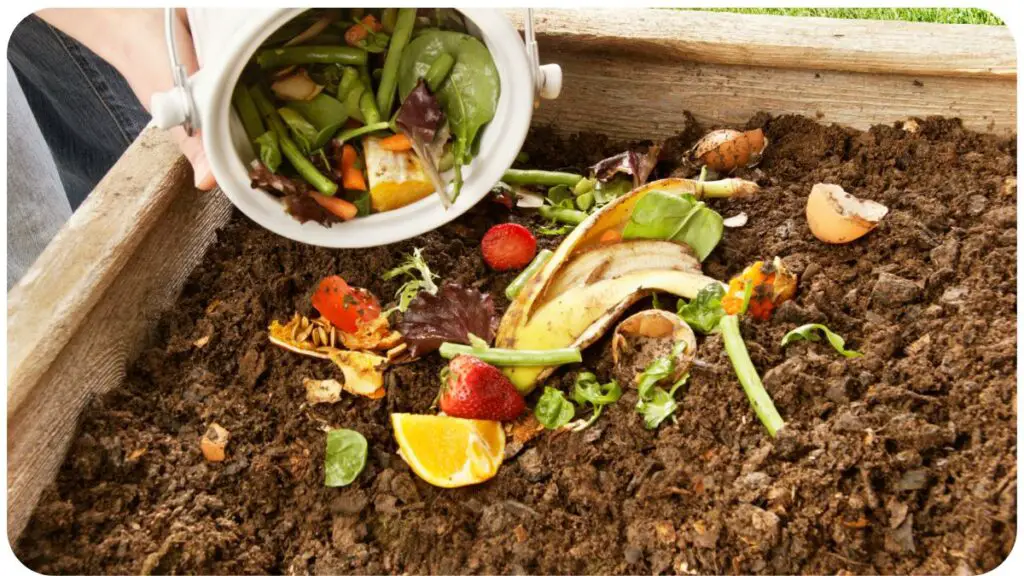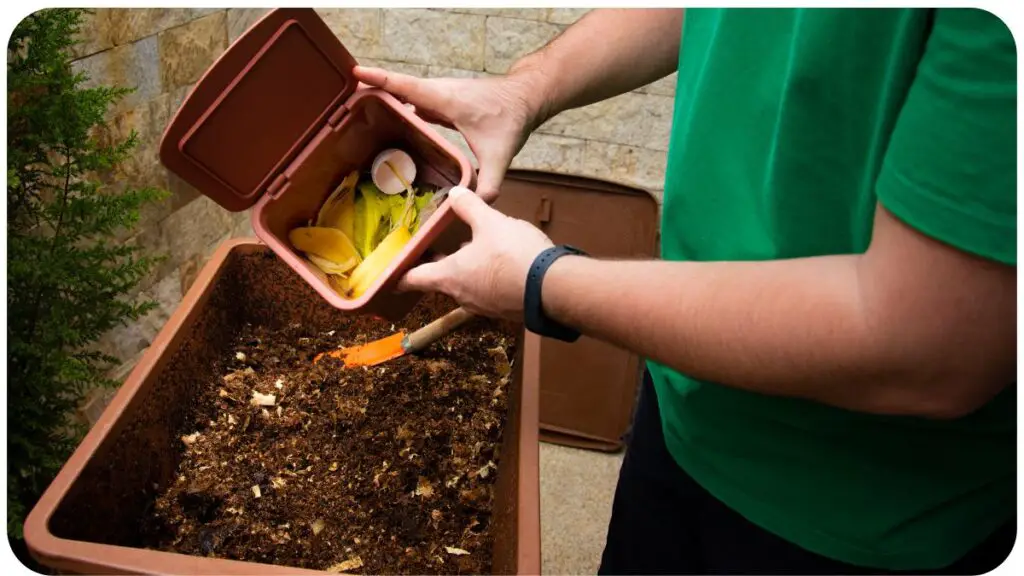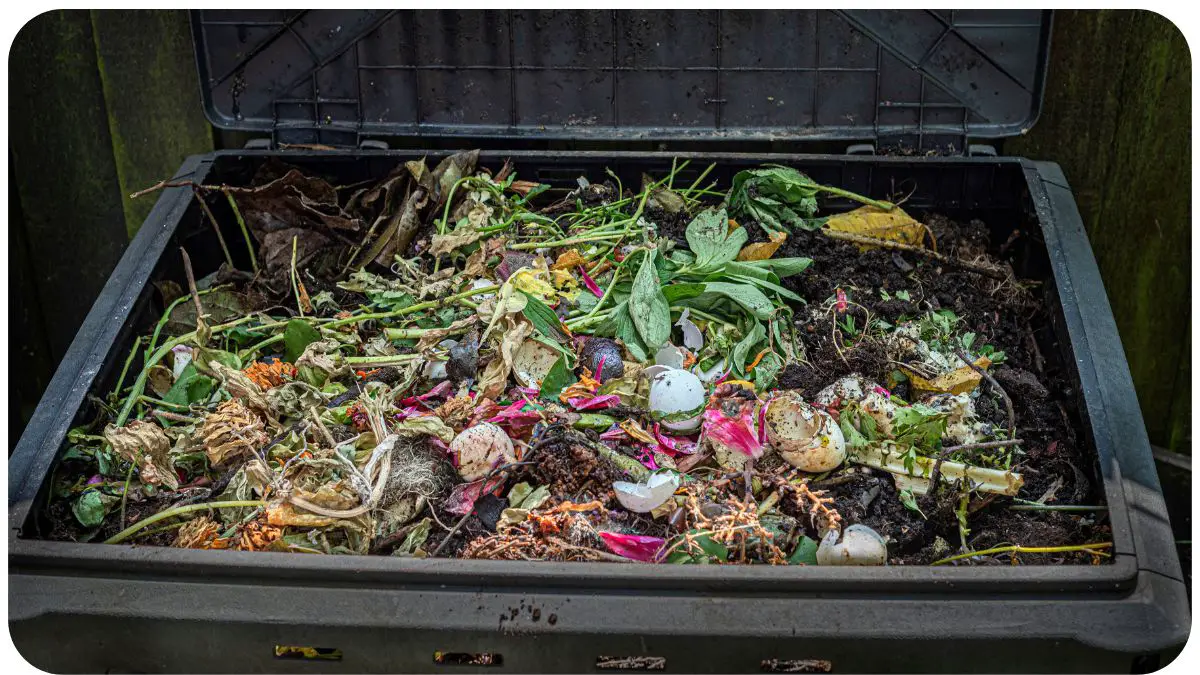Welcome to the world of composting, where kitchen scraps can transform into nutrient-rich soil for your garden. In this article, we’ll explore the process of turning kitchen scraps into garden gold through composting.
Whether you’re a seasoned gardener or just starting out, composting is a sustainable practice that benefits both your plants and the environment.
| Takeaways |
|---|
| 1. Composting turns kitchen scraps into nutrient-rich soil for your garden. |
| 2. Balancing green and brown materials is crucial for successful composting. |
| 3. Regular turning and moisture management help speed up decomposition. |
| 4. Compost can be used as soil amendment, topdressing, mulch, and compost tea. |
| 5. Composting is an eco-friendly way to reduce waste and improve soil health. |
2. Benefits of Composting

Composting offers a myriad of benefits, both for your garden and the planet. Not only does it reduce waste sent to landfills, but it also enriches soil, improves soil structure, retains moisture, and suppresses plant diseases. Additionally, composting helps to reduce greenhouse gas emissions by diverting organic matter from landfills where it would otherwise release methane, a potent greenhouse gas.
Compost enriches soil, fostering healthy plant growth. Its benefits extend beyond nutrition, improving soil structure and water retention, vital for thriving gardens. Embrace composting to transform kitchen scraps into precious garden gold. Learn more about its advantages in this insightful article.
3. Getting Started with Composting
To get started with composting, you’ll need a few essential materials and a suitable location for your compost bin.
Materials Needed for Composting
Here’s a list of materials you’ll need to start composting:
| Item | Description |
|---|---|
| Compost Bin | Container for holding compost materials |
| Kitchen Scraps | Fruit and vegetable scraps, coffee grounds, etc. |
| Yard Waste | Grass clippings, leaves, small branches, etc. |
| Brown Materials | Dry leaves, straw, shredded paper, cardboard, etc. |
| Water | To keep the compost pile moist |
| Pitchfork or Shovel | For turning the compost pile |
Setting Up Your Compost Bin
Choose a location for your compost bin that’s convenient yet out of direct sunlight. Layer your compost materials, alternating between green (nitrogen-rich) and brown (carbon-rich) materials. Ensure proper aeration by turning the compost pile regularly to speed up decomposition.
Tower and wall gardens offer innovative solutions for maximizing limited gardening space. Ideal for urban dwellers or those with small yards, these vertical gardening methods unlock the potential for lush greenery. Learn how to optimize space with vertical gardening in this insightful article.
4. What Can You Compost?

Not all kitchen scraps are suitable for composting. Here’s a handy table outlining what you can and cannot compost:
| Compostable Items | Non-Compostable Items |
|---|---|
| Fruit and Vegetable Scraps | Meat and Dairy Products |
| Coffee Grounds | Oily Foods |
| Eggshells | Pet Waste |
| Yard Waste | Diseased Plants |
| Shredded Paper | Synthetic Materials |
5. Tips for Successful Composting
Achieving successful composting requires a balance of green and brown materials, proper moisture levels, and regular aeration. Here are some tips to help you along the way:
- Maintain the Right Balance: Aim for a ratio of roughly 2 parts brown materials to 1 part green materials. This balance provides the ideal environment for decomposition.
- Chop or Shred Large Materials: Cutting or shredding large materials like branches or cardboard helps speed up decomposition by increasing the surface area for microbes to work on.
- Keep the Pile Moist: Your compost pile should be as damp as a wrung-out sponge. If it’s too dry, add water. If it’s too wet, add more brown materials to absorb excess moisture.
- Turn the Pile Regularly: Turning the compost pile every few weeks aerates the mixture, helping to speed up decomposition and prevent odors.
- Monitor Temperature: A properly functioning compost pile will generate heat as organic matter breaks down. Use a compost thermometer to ensure the temperature stays between 110°F and 160°F (43°C to 71°C) for optimal decomposition.
Organic gardening practices contribute significantly to soil health. By prioritizing natural methods, gardeners nurture a balanced ecosystem, fostering robust plant growth. Discover how embracing organic gardening can enhance soil vitality in this informative guide.
6. Troubleshooting Common Composting Issues
Despite your best efforts, you may encounter some challenges along the way. Here’s a troubleshooting guide to help you address common composting issues:
| Issue | Possible Cause | Solution |
|---|---|---|
| Smelly Compost Pile | Too much green material | Add more brown materials to balance the pile |
| Poor aeration | Turn the pile more frequently to improve airflow | |
| Slow Decomposition | Lack of nitrogen | Add more green materials to increase nitrogen content |
| Dry or compacted pile | Add water and fluff up the pile with a pitchfork | |
| Pests in Compost | Uncovered pile | Cover the compost pile with a tarp or lid to deter pests |
| Attracting pests with food scraps | Bury food scraps deeper within the pile |
7. Using Compost in Your Garden
Once your compost has decomposed into dark, crumbly soil, it’s ready to be used in your garden. Here are some ways to incorporate compost into your gardening routine:
- Soil Amendment: Mix compost into the soil before planting to improve soil structure, water retention, and nutrient levels. Aim for a ratio of about 1 part compost to 2 parts soil.
- Topdressing: Spread a layer of compost on the surface of your garden beds to provide a slow-release source of nutrients for existing plants. This can also help suppress weeds and retain soil moisture.
- Mulching: Use compost as mulch around trees, shrubs, and garden beds to insulate the soil, suppress weeds, and retain moisture. Apply a layer of compost 2-3 inches thick, keeping it several inches away from plant stems.
- Compost Tea: Steep compost in water to create compost tea, a nutrient-rich liquid fertilizer for your plants. Use a ratio of about 1 part compost to 5 parts water, and let it steep for 1-2 days before applying to plants.
Gardening in arid climates presents unique challenges, requiring specialized strategies for success. Despite limited water availability, it’s possible to cultivate greenery and beauty. Explore effective techniques for thriving in dry environments in this comprehensive resource.
8. Conclusion
Composting is a simple yet rewarding practice that turns kitchen scraps into valuable garden gold. By diverting organic waste from landfills and transforming it into nutrient-rich soil, you can enrich your garden, reduce your environmental footprint, and cultivate a healthier planet.
Whether you’re a beginner or seasoned gardener, give composting a try and watch your garden thrive!
Further Reading
- Composting 101: Turning Waste into Garden Gold: Explore this comprehensive guide to composting, covering everything from the basics to advanced techniques.
- Turning Kitchen Scraps to Garden Gold: Learn how to transform kitchen scraps into nutrient-rich compost for your garden with tips and tricks from this informative article.
- Composting: Turns Garbage to Garden Gold: Discover the environmental benefits of composting and how it can turn household waste into valuable soil conditioner with this insightful resource.
FAQs
What is composting?
Composting is the process of decomposing organic matter, such as kitchen scraps and yard waste, into nutrient-rich soil amendment.
How does composting benefit the environment?
Composting reduces waste sent to landfills, decreases greenhouse gas emissions, and improves soil health and fertility.
Can I compost all kitchen scraps?
Most fruit and vegetable scraps, coffee grounds, eggshells, and yard waste can be composted. However, avoid composting meat, dairy, oily foods, and synthetic materials.
How long does it take to make compost?
The time it takes to make compost depends on various factors such as temperature, moisture, and the ratio of green to brown materials. Generally, it can take anywhere from a few weeks to several months to produce compost.
How do I know when compost is ready to use?
Compost is ready to use when it is dark, crumbly, and earthy-smelling. It should no longer resemble its original materials and should be fully broken down.

For 15 years, Hellen James has worked in the gardening industry as an expert and landscape designer. During her career, she has worked for a variety of businesses that specialize in landscaping and gardening from small firms to large corporations.

